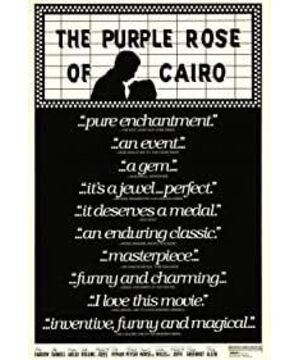I think "The Purple Rose of Cairo" is interesting:
The background of the story is set during the economic depression in the 1930s in the United States. The filming technique, interpretation method and plot mode of the story follow the path of melodrama in the 1930s.
The characters all appear to be a little floating, unable to stand, too far away from the audience, appear more dreamy, and break away from the "real"
This is a characteristic of the old movies at that time. "The Purple Rose of Cairo" is a continuation of this "routine", but it has a kind of cuteness .
Especially the performance of Mia Farrow is really fascinating.
She plays Cecilia, a housewife who has no love. She made her voice lighter, and tried to make her whole body more tense and more careful, making people look so conscientious and pitiful.
She likes watching movies, especially love movies.
A person who cannot get love in reality will always think about getting love by throwing himself into the arms of the screen.
A miracle happened.
When she went to the theater to watch "The Purple Rose of Cairo" for the fifth time, an explorer named Tom walked out of the screen.
This is a moment of genius, this is an amazing moment in film history.
To go from fiction to reality requires the magic of movies, as well as courage and faith.
Reminds me of a story: a paralyzed girl stood up because she was chasing pigeons.
Tom fell in love with Cecilia and couldn't help rushing out of the screen.
A character thus gained life and found freedom.
The brilliance of Woody Allen is that he made Gil, the explorer, fall in love with Cecilia, and the weight confrontation between real and fiction begins.
The humble Cecilia was still lamenting the miserable life experience yesterday, and was fallen in love with two handsome princes today. This seems to be a window specially opened for her by God.
After a few choices, she finally chose the realistic Gil, although in our opinion Tom loves her more, because Tom is so sincere and perfect, he satisfies all the girls' lust for the lover of their dreams.
When the audience falls in love with a character, they will always lament that the character is just a character, and reality does not exist.
Woody Allen wants to give life to the character and make the character appear in front of the public alive.
But when I really saw such a perfect fictional character, I felt a little frustrated when I thought that he was just a movie character and that reality did not exist at all.
The audience is really hard to serve.
Although Cecilia likes fictional movies, she tries to make herself sober. So she chose the realistic Gil and said goodbye to the fictional character.
Of course we would say that Cecilia really chose reality, but the ironic thing is: Gil finally abandoned her and returned to Hollywood alone.
Cecilia's seemingly realistic choice is actually a bubble in the air, which burst at one point.
Her fantasies about Gil made her ruthlessly reject the fictitious Tom, but it was nothing.
Before making a decision, the movie is actually pointing to the wisest and most painful choice: choose no one, go home, and get a good night’s sleep.
Because whoever chooses is illusory, there is no result.
This is the saddest and cruelest part of this movie.
But Woody Allen deserves to be Woody Allen.
The last scene of the movie: The extremely lost Cecilia went to the cinema to see Astaire's "Top Hat". Under the aphrodisiac of the light and shadow story, Cecilia finally smiled.
This is the most moving part of the movie, because of this scene, the movie suddenly has Bergman's power.
That is the desire for life, the call for love.
People can't help thinking that "Still in the Mirror" finally uses "Love is God" to give the audience a sudden hope, which is also an overwhelming move.
And this time Cecilia regained her confidence and love in life through the film.
When life is in a quagmire, don’t we still have movies?
When life is unsatisfactory, we can plunge into the movie to seek healing;
When love is not available, we can embrace the screen to get the joy of love, even if it is short-lived, even if it is illusory.
Therefore, my wishful interpretation is that Woody Allen is using this movie to spur us:
Everyone, you must love movies, love life, and love yourself!
Cecilia's last smile is the victory of the movie, the victory of the fans.
I even believe that at the end of the movie, the handsome Astaire jumped out of the screen lightly and smiled at Cecilia: Lady, can we have a dance?
First release in: a few movies
View more about The Purple Rose of Cairo reviews











